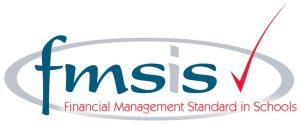Nursery have been counting quantities to 5. We have been practicing showing the quantities up to 5 using our fingers.
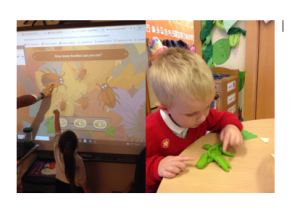
Reception class have been working on matching and sorting. The children used the groups sorted to compare amounts, talking about which group has more or fewer. Next, the children used their knowledge of matching to learn about two step patterns. The children really enjoyed creating our own patterns and spotting mistakes in Mrs Thompson’s patterns! In number we have focused on the numbers 1, 2 and 3. We have looked at counting to 3, representing these numbers and the composition of 1, 2 and 3.
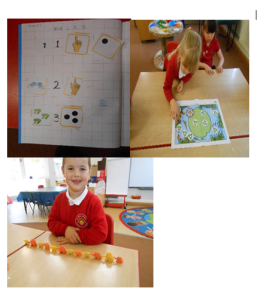
Year 1 have been learning about place value within 10. The children have enjoyed using concrete, pictorial and abstract representations. They now understand that collections of objects can be sorted into sets based on attributes such as colour, size or shape. They can fluently count to 10 when counting objects and count a specific number of objects. Children can count on from any number while staying within 10 and can place numbers on a number track using mathematical language of ‘1 more’. They can also count backwards and place numbers on a number track using mathematical the language of ‘1 less’. The children have learnt how to describe quantities of objects as ‘fewer’, ‘more’ or ‘equal to’ when comparing pairs of numbers within 10 and can now use the matching symbols ≤ ≥ =.
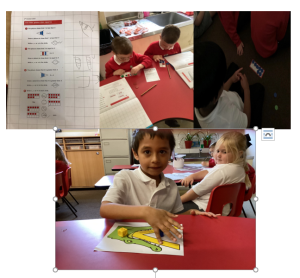
Year 2 have focused on place value this half term, learning about partitioning numbers into tens and ones. We then moved on to counting in 3’s which we found challenging. In our final week of term, we have begun our addition and subtraction unit and have been recapping our number bonds to 10 in order to add numbers to 100.
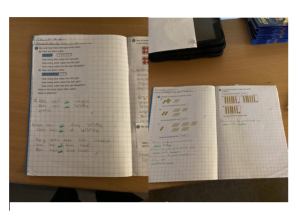
Year 3 have been exploring Number, Place value, Addition and Subtraction this half-term. We have explored how to partition numbers in different ways and have used place value grids, base 10, place value counters and whole-part models to help us with this. In addition, and subtraction, we are beginning to use column methods to solve calculations.
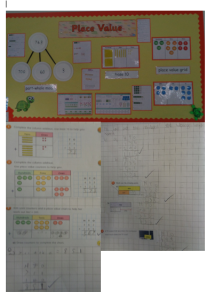
Year 4 have been extending their Place Value knowledge this half term. The children have been able to partition 4-digit numbers into thousands, hundreds, tens and ones, using place value charts, part whole models and bar models. The children moved onto placing 4-digit numbers onto a number line, before learning how to round to the nearest 10,100 and 1000. They completed the unit by learning how to read and use Roman Numerals
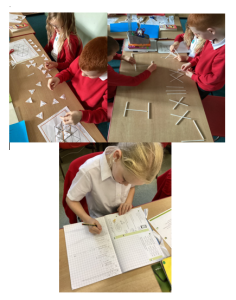
Year 5 have been learning about place value in numbers up to 1,000,000. The children have used their knowledge and understanding of place value to write numbers using the part-whole model. They have also used concrete manipulatives and applied their knowledge and skills of square and cube numbers to solve problems.
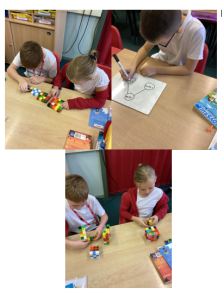
Year 6 have been learning about place value in numbers up to 10,000,000. The children have used their knowledge and understanding of place value to round and add and subtract integers. They have also looked at rules of divisibility, factors and multiples which has helped us to multiply and divide larger numbers.
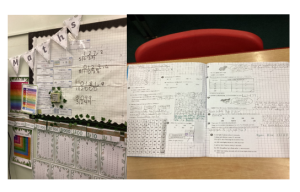
Intent
At St Helen Auckland Primary, we recognise the importance of ensuring that the fundamental skills of fluency, reasoning and problem solving are embedded within lessons. We want children to foster an enthusiasm for maths and be engaged in learning experiences which will challenge and inspire them. We recognise the high value of maths in our world and strive for children to become confident and inquisitive.
We follow the National Curriculum for Mathematics, which aims to ensure that all children:
become fluent in the fundamentals of mathematics, including through varied and frequent practice with increasingly complex problems over time, so that pupils develop conceptual understanding and the ability to recall and apply knowledge rapidly and accurately
reason mathematically by following a line of enquiry, conjecturing relationships and generalisations, and developing an argument, justification or proof using mathematical language
can solve problems by applying their mathematics to a variety of routine and non-routine problems with increasing sophistication, including breaking down problems into a series of simpler steps and persevering in seeking solutions
Maths is taught progressively through the sharing of key knowledge and skills, alongside visual representations of mathematical concepts and ideas. We recognise the importance of children also developing an enjoyment of mathematics and to experience success in the subject developing their ability to reason and solve problems with increasing confidence through working in a range of different ways and sharing ideas with each other.
We want to develop children’s skills in every day maths, therefore recognising the importance of maths in the wider world, using their mathematical understanding to make connections in their own lives and through a range of different contexts. We aim to develop children’s curiosity about the subject, as well as an appreciation of how maths can help everyone in our world today.
noticing
perseverance
questioning
making links
reasoning
planning
revising
collaboration
Children using everyday maths skills
Implementation
Our long-term planning for maths follows the National Curriculum and it covers the following areas:
Number
Addition and subtraction
Multiplication and division
Fractions
Ratio and proportion
Algebra
Measurement
Geometry (Properties of shape)
Geometry (Position and direction)
Statistics
The above units of work are taught termly and allow our children to learn new concepts as well as have lots of practise of previous learning, this will enable them to know and remember more.
A variety of planning materials and resources allow teachers to be flexible and to meet the needs of the children.
Lessons are taught daily, in KS1 and KS2 for approximately one hour and in FS2 for approximately 20 minutes. Lessons are engaging and follow the model of concrete, pictorial and abstract approach using a range of resources and different models to suit the children, for example when teaching division children would explore how to use counters to share, move onto using diagrams and then would be confident to practice without. Lessons begin with a mental oral session which allows the children to practise and consolidate their arithmetic skills. Children will be introduced to new vocabulary and this will be used consistently and accurately throughout units of work. Children will also be taught the importance of using their maths skills in everyday life and that adults also need to use their maths skills, on a daily basis and will have opportunities to use their skills in other curriculum areas.
Teachers have good subject knowledge and plan lessons which build upon previous knowledge and take into consideration what was taught in the previous year by referring to the objectives for the year group as well as the DfE ready to progress criteria. Teachers plan suitable activities to help the children practise what they have been learning. Children use Maths Rock Stars to develop and promote recall of times tables and other skills in addition and subtraction.
Formative assessment is used continuously to help identify children who are making less than expected progress or those who need an extra challenge. When a child needs extra support, we intervene and provide catch-up sessions, or interventions to give them the support they require. Children are also provided with the opportunity to work collaboratively with their peers. When the children need a challenge they are challenged throughout the lesson and are provided with reasoning and problem solving tasks to extend their learning and practise what they have learnt. When problem solving children are taught the strategy REAL (read, examine, act, look back) to help them solve a range of mathematical problems.
Impact
Mathematics is taught in this way so that children will be confident in the areas of maths. They will use their maths skills across other core or subject areas. They will develop a thirst for learning and support each other in their learning. Through discussion and feedback, children will be able to talk enthusiastically about their maths lessons and speak about how they love learning maths. They understand how maths links to real life purposes and is an important part of life across the world. Children use acquired vocabulary in maths lessons and are actively encouraged to use this with accuracy. They have the skills to use methods independently and show resilience when tackling problems. Children will be able to discuss their learning and remember what they have learnt during their half termly meetings with subject leaders. Children are assessed termly based on the objectives taught during that term.
Above all, they will know more and remember more which will help on the next stage of their learning journey into KS3.
Long Term plans








